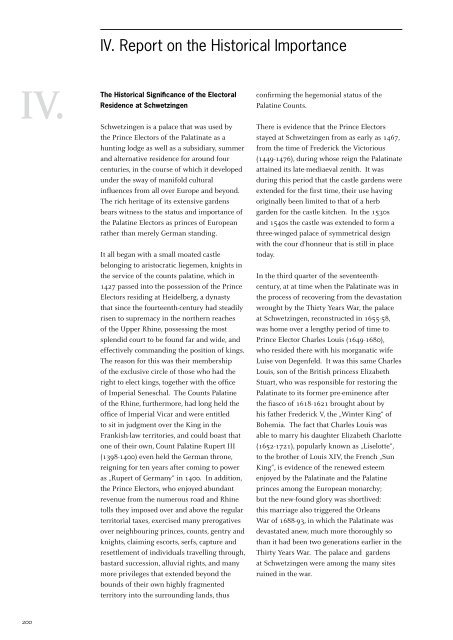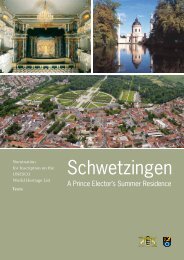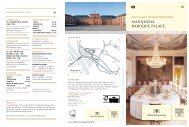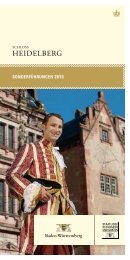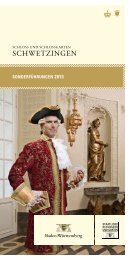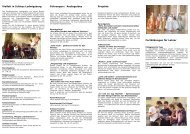3. - Schlösser-Magazin
3. - Schlösser-Magazin
3. - Schlösser-Magazin
Create successful ePaper yourself
Turn your PDF publications into a flip-book with our unique Google optimized e-Paper software.
IV.<br />
200<br />
IV. Report on the Historical Importance<br />
The Historical Significance of the Electoral<br />
Residence at Schwetzingen<br />
Schwetzingen is a palace that was used by<br />
the Prince Electors of the Palatinate as a<br />
hunting lodge as well as a subsidiary, summer<br />
and alternative residence for around four<br />
centuries, in the course of which it developed<br />
under the sway of manifold cultural<br />
influences from all over Europe and beyond.<br />
The rich heritage of its extensive gardens<br />
bears witness to the status and importance of<br />
the Palatine Electors as princes of European<br />
rather than merely German standing.<br />
It all began with a small moated castle<br />
belonging to aristocratic liegemen, knights in<br />
the service of the counts palatine, which in<br />
1427 passed into the possession of the Prince<br />
Electors residing at Heidelberg, a dynasty<br />
that since the fourteenth-century had steadily<br />
risen to supremacy in the northern reaches<br />
of the Upper Rhine, possessing the most<br />
splendid court to be found far and wide, and<br />
effectively commanding the position of kings.<br />
The reason for this was their membership<br />
of the exclusive circle of those who had the<br />
right to elect kings, together with the office<br />
of Imperial Seneschal. The Counts Palatine<br />
of the Rhine, furthermore, had long held the<br />
office of Imperial Vicar and were entitled<br />
to sit in judgment over the King in the<br />
Frankish-law territories, and could boast that<br />
one of their own, Count Palatine Rupert III<br />
(1398-1400) even held the German throne,<br />
reigning for ten years after coming to power<br />
as „Rupert of Germany“ in 1400. In addition,<br />
the Prince Electors, who enjoyed abundant<br />
revenue from the numerous road and Rhine<br />
tolls they imposed over and above the regular<br />
territorial taxes, exercised many prerogatives<br />
over neighbouring princes, counts, gentry and<br />
knights, claiming escorts, serfs, capture and<br />
resettlement of individuals travelling through,<br />
bastard succession, alluvial rights, and many<br />
more privileges that extended beyond the<br />
bounds of their own highly fragmented<br />
territory into the surrounding lands, thus<br />
confirming the hegemonial status of the<br />
Palatine Counts.<br />
There is evidence that the Prince Electors<br />
stayed at Schwetzingen from as early as 1467,<br />
from the time of Frederick the Victorious<br />
(1449-1476), during whose reign the Palatinate<br />
attained its late-mediaeval zenith. It was<br />
during this period that the castle gardens were<br />
extended for the first time, their use having<br />
originally been limited to that of a herb<br />
garden for the castle kitchen. In the 1530s<br />
and 1540s the castle was extended to form a<br />
three-winged palace of symmetrical design<br />
with the cour d‘honneur that is still in place<br />
today.<br />
In the third quarter of the seventeenthcentury,<br />
at at time when the Palatinate was in<br />
the process of recovering from the devastation<br />
wrought by the Thirty Years War, the palace<br />
at Schwetzingen, reconstructed in 1655-58,<br />
was home over a lengthy period of time to<br />
Prince Elector Charles Louis (1649-1680),<br />
who resided there with his morganatic wife<br />
Luise von Degenfeld. It was this same Charles<br />
Louis, son of the British princess Elizabeth<br />
Stuart, who was responsible for restoring the<br />
Palatinate to its former pre-eminence after<br />
the fiasco of 1618-1621 brought about by<br />
his father Frederick V, the „Winter King“ of<br />
Bohemia. The fact that Charles Louis was<br />
able to marry his daughter Elizabeth Charlotte<br />
(1652-1721), popularly known as „Liselotte“,<br />
to the brother of Louis XIV, the French „Sun<br />
King“, is evidence of the renewed esteem<br />
enjoyed by the Palatinate and the Palatine<br />
princes among the European monarchy;<br />
but the new-found glory was shortlived:<br />
this marriage also triggered the Orleans<br />
War of 1688-93, in which the Palatinate was<br />
devastated anew, much more thoroughly so<br />
than it had been two generations earlier in the<br />
Thirty Years War. The palace and gardens<br />
at Schwetzingen were among the many sites<br />
ruined in the war.


